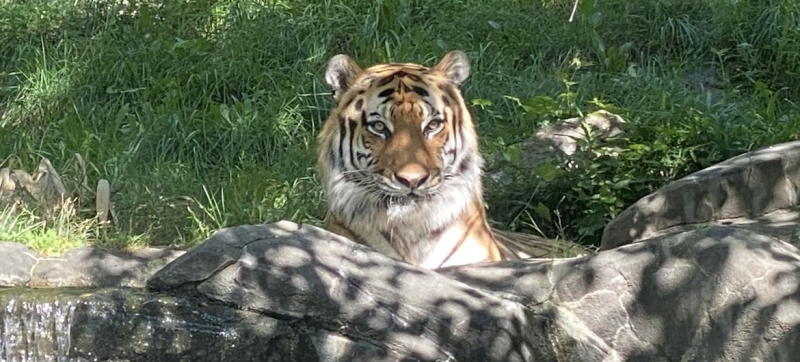- India Sees 9% Drop in Foreign Tourists as Bangladesh Visits Plunge |
- Dhaka Urges Restraint in Pakistan-Afghan War |
- Guterres Urges Action on Safe Migration Pact |
- OpenAI Raises $110B in Amazon-Led Funding |
- Puppet show enchants Children as Boi Mela comes alive on day 2 |
UN Chief Urges Urgent Global Effort to Halt Biodiversity Loss

A tiger cools off in a stream during a hot day in Chitwan National Park, Nepal. Thanks to the dedication of local communities and government initiatives, the park’s tiger population has seen a resurgence. Yet, the majestic species remains critically endangered. (Photo: UN News/Vibhu Mishra)
UN Secretary-General António Guterres has issued a stark warning to the global community, calling on nations to radically transform their relationship with nature amid what he describes as a “biodiversity emergency.” Marking the International Day for Biological Diversity on Thursday, Guterres said the degradation of the natural world is accelerating at a pace too fast to ignore—and too dangerous to leave unaddressed.
In his address, the UN chief reminded the world that biodiversity is not a luxury, but a necessity—a foundation upon which life depends and a cornerstone of sustainable development. Yet, that foundation is under severe threat. “Humanity is destroying biodiversity at lightning pace,” he said, citing pollution, the climate crisis, and unchecked exploitation of ecosystems as the chief culprits. “This destruction is not just reckless—it is self-defeating.”
Guterres underscored that the crisis knows no borders. No nation, he insisted, “however rich or powerful,” can protect itself from the cascading effects of environmental collapse. Whether through food insecurity, climate instability, or public health emergencies, the consequences of biodiversity loss are shared by all.
The warning comes at a time when the natural world is reaching a breaking point. Scientists estimate that one million species are now at risk of extinction. Human activity has altered nearly three-quarters of the Earth’s land surface and two-thirds of marine environments. The collapse of ecosystems not only threatens the planet’s beauty and biological richness, but also jeopardises progress on the Sustainable Development Goals, particularly those related to food, water, health, and climate action.
In response, the Secretary-General has called for the urgent and full implementation of the Kunming-Montreal Global Biodiversity Framework—a landmark agreement adopted in 2022 to halt and reverse nature loss by 2030. This includes fulfilling national biodiversity action plans, increasing financial support for conservation efforts, removing environmentally harmful subsidies, and empowering local communities, Indigenous Peoples, women, and youth to play a central role in preserving biodiversity.
He also drew attention to the deep connection between biodiversity and human well-being. Roughly three billion people rely on fish as a primary source of animal protein, and nearly 80 per cent of rural populations in developing countries depend on plant-based medicine. At the same time, the destruction of forests and wildlife habitats is heightening the risk of zoonotic diseases—those transmitted from animals to humans—making the protection of biodiversity not only an ecological imperative, but a public health necessity.
In a world already strained by conflict, inequality, and climate change, Guterres argued that safeguarding biodiversity offers a pathway to resilience and peace. “Living in harmony with nature and sustainable development is humanity’s path to a better world for all,” he said. “Together, let us take it.”
The International Day for Biological Diversity, observed each year on 22 May, was established by the United Nations in 2000 to raise awareness and understanding of biodiversity issues. The date commemorates the adoption of the Convention on Biological Diversity in 1992, a milestone in the global effort to protect the planet’s irreplaceable natural wealth.

